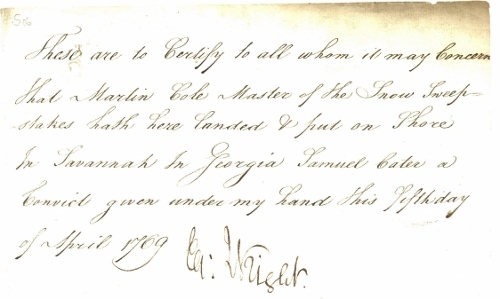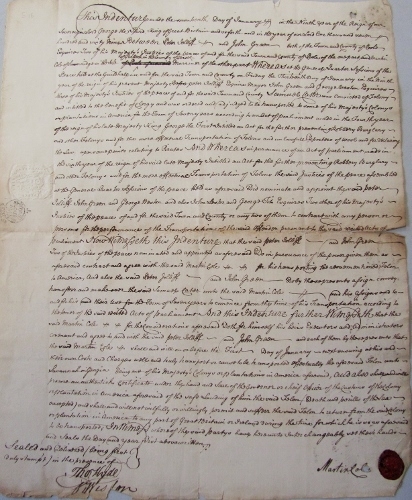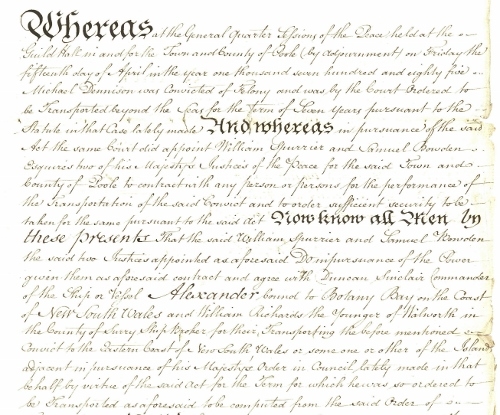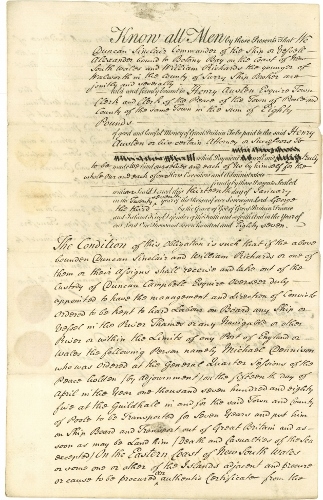Transportation records in the Borough of Poole Archive provide a fascinating insight into the fate of 18th century convicts, including one of the very first Europeans sent to Australia.

Most people know the story of Dorset’s most famous transportees, the Tolpuddle Martyrs sent to Australia in 1834 for setting up a Friendly Society. Now, Quarter Sessions records from the Borough of Poole Archive can reveal the fate of earlier convicts.
What was transportation?
From the early 1600s to the 1860s, transportation was a penalty handed out to hundreds of thousands of men, women and children who had committed felonies, but whose crimes were not sufficiently severe to warrant a death sentence. Prior to the start of the American War of Independence in the 1770s, most British prisoners sentenced to transportation were sent to the Americas for a set number of years.
The transportation of prisoners was administered by the Quarter Sessions, a court which met four times per year at Epiphany, Easter, Midsummer and Michaelmas. Among the thousands of records created by Poole Quarter Sessions, one hidden gem is a handful of 18th century transportation records (reference DC-PL/C/B/10). Looking at the case of one convict, we can see how the process worked….
The Transportation of Samuel Cater
The first document issued by the Quarter Sessions was a court order for the prisoner to be transported abroad – this tells us the name of the convict, the type of crime which has been committed, roughly where the convict was to be sent and how long they were to remain there. Cater was to be sent to America for the term of seven years.
The next stage was arranging transportation. A contract was issued between Poole’s Justices of the Peace and an individual willing to deliver the convict to their destination. We learn that the man charged with transporting Cater was Martin Cole, a mariner, who was to deliver Cater to Savannah, Georgia. A bond accompanied the contract, a pledge to pay a set amount of money if the contract was not fulfilled.
The final record relating to Cater’s transportation is a certificate confirming the landing of the convict in a foreign port. From this document, dated 5 April 1769, we learn when Cater arrived in the New World and on which ship he travelled – the wonderfully named ‘Snow Sweepstakes’.
Digging deeper
We can sometimes look further back in the court records for additional information on the convict. From a Poole Borough Quarter Sessions indictment of 13 October 1768, we learn more about Cater and the crime for which he was condemned to seven long years in Savannah. Pleading not guilty, Cater, a labourer from Poole, was tried in a case brought by Mr William Williams and found guilty of stealing three pieces of old canvas worth a mere 10 shillings. Other records in the Borough Archive suggest that this may not have been Cater’s first time in front of a judge – he had been summoned to the Court of Record accused of two separate cases of trespass in the preceding two years!
The ‘First Fleet’ and Australia Day
The year 1787 marked the beginning of transportation to Australia. Within the Poole Archive we find evidence of a very early example, a December 1786 contract and January 1787 bond with Duncan Sinclair, Commander of the vessel ‘Alexander’ for the transportation of Michael Dennison to New South Wales. These records are particularly significant as the ‘Alexander’ was one of eleven ships of the infamous ‘First Fleet’ which left England in May 1787 to found the first European settlement in Australia at Botany Bay. The anniversary of the fleet’s arrival is now celebrated as Australia’s national holiday ‘Australia Day’ on 26 January.







This was really useful documents. Is there any evidence Poole Harbour ships took transports to America or Australia. Who could I contact to check this?
Sincerely, David Fenner
Thank-you for your comment David. If you want to send an email to ‘archives@dorsetcouncil.gov.uk’, one of our team can look into things for you.